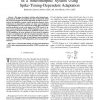Free Online Productivity Tools
i2Speak
i2Symbol
i2OCR
iTex2Img
iWeb2Print
iWeb2Shot
i2Type
iPdf2Split
iPdf2Merge
i2Bopomofo
i2Arabic
i2Style
i2Image
i2PDF
iLatex2Rtf
Sci2ools
121
click to vote
TNN
2008
2008
Minimizing the Effect of Process Mismatch in a Neuromorphic System Using Spike-Timing-Dependent Adaptation
Abstract--This paper investigates whether spike-timing-dependent plasticity (STDP) can minimize the effect of mismatch within the context of a depth-from-motion algorithm. To improve noise rejection, this algorithm contains a spike prediction element, whose performance is degraded by analog very large scale integration (VLSI) mismatch. The error between the actual spike arrival time and the prediction is used as the input to an STDP circuit, to improve future predictions. Before STDP adaptation, the error reflects the degree of mismatch within the prediction circuitry. After STDP adaptation, the error indicates to what extent the adaptive circuitry can minimize the effect of transistor mismatch. The circuitry is tested with static and varying prediction times and chip results are presented. The effect of noisy spikes is also investigated. Under all conditions the STDP adaptation is shown to improve performance.
Related Content
| Added | 29 Dec 2010 |
| Updated | 29 Dec 2010 |
| Type | Journal |
| Year | 2008 |
| Where | TNN |
| Authors | Katherine Cameron, Alan Murray |
Comments (0)

